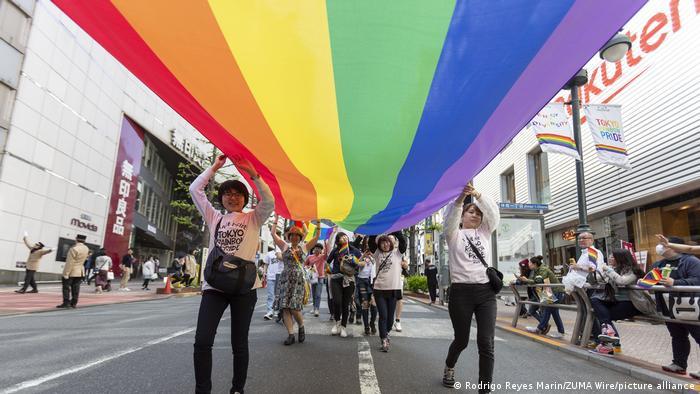Japan: Same-sex Couples Face Resistance to Adoption

Public surveys show that the number of people who are positive about the issue is increasing
Ai Takahashi says she has always wanted to have a child but Japan's "traditional" attitudes towards family and only incremental acceptance of equal rights for the nation's LGBTQ+ community means she is losing hope that she might one day be a parent.
That same-sex couples in Japan find it effectively impossible to adopt, she believes, is a pity for the thousands of youngsters waiting in children's homes across Japan for a foster family or adoptive parents.
"I have always wanted to have children," says Takahashi, a 40-year-old writer who lives in Tokyo. "I was once married to a man and even then I thought long and hard about having children. Now I live with my partner, a woman, and I have decided that I would rather live with a child who has already been born than to give birth," she told DW.
"Japan does not allow couples to adopt a child unless they are married. And since same-sex marriage is not legally recognized in Japan, we cannot be a married couple," she added.
High hurdles to fostering
An alternative that she has considered is fostering, although that has high hurdles as well. The rules on foster parents were only revised last year, making fostering an option for same-sex couples. But the conditions were excessively strict, Takahashi said, with requirements on annual income, the size of the child's living area, limitations on a foster parent's working hours and the need to guarantee a place at one of Japan's hard-pressed childcare facilities putting fostering out of reach of many couples.
There are more than 45,000 children in an estimated 600 residential facilities across Japan. As elsewhere, the children come from homes where parents are abusive or where they cannot care for their children due to ill-health or financial problems. Others have been simply abandoned.
"I would very much like to adopt, but the reality is that it is tough and I do not know what the future holds. I do not want to just 'give birth,' but if there are children out there who are not in a nurturing environment right now, then I would like to live with those children."
Akikazu Takami and his gay partner have recently been accepted as foster parents in Aichi Prefecture, central Japan, but have come up against resistance from parents whose children are being fostered.
"We applied to be foster parents and we finally received a positive response, although the officials did say that issues might come up," he said. "But they said we would figure it out when the time came."
Officials who are tasked with placing children with foster families are still duty-bound to inform the biological parents of where they are going, with many biological parents not considering a same-sex couple.
Opposition from biological parents
"Even when the child guidance center thinks that we are a match for a child, it seems there are many times when the parents simply refuse," he said.
Kumi Matsumoto, a campaigner with Rainbow Family, an advocacy group for sexual minority families who are raising children, says entrenched attitudes and outdated perceptions of what a family should consist of mean that thousands of children who could potentially be growing up with loving foster or adoptive parents are still living in institutions.
"Currently in Japan, only married couples are allowed to adopt children. Foster parents can also register, but in reality, very few are actually entrusted with children. Unfortunately, sexual minorities are not treated equally in Japanese society," she told DW.
"Same-sex marriages are not recognized, and as a result, they are excluded from various legal protections and tax benefits as couples and families," she added.
"I believe that the discriminatory treatment of LGBTQ+ individuals has gradually improved over the past decade, thanks to the efforts of various LGBTQ+ organizations and individuals to raise awareness. However, social human rights remain inhibited because of discriminatory treatment by the underlying national laws," Matsumoto underlined.
And when it comes to orphanages considering whether to allow a same-sex couple to adopt, she says "they may be prejudiced and believe that same-sex couples are not capable of happily raising foster children."
'Lack of understanding'
"I think this is due to a lack of understanding and ignorance on the part of the foster home administrators. In addition, since the Japanese government is riddled with conventionalism, I think that there are no officials who have the courage or the spirit to change the way things have always been done," according to Matsumoto.
"The government gives the excuse of 'a lack of public understanding' as the reason for not recognizing same-sex marriages, even though public awareness surveys show that the number of people who are positive about the issue is increasing, especially among the younger generation," she added. "That is why I believe it is important to make sexual minorities visible, as well as stepping up activities such as lawsuits to permit same-sex marriages."
For Ai Takahashi, change cannot come soon enough.
"The rights of same-sex couples are very weak in Japan. I am very frustrated as a person in a same-sex relationship because we do not have the same rights as married couples. We want to have children in the same way, but we are not allowed to do so. We are a couple, just the same," she asserted.
"Japanese politicians are not really thinking about what is best for families or children, but only about their own position," she added. "It is very sad. I feel there is no future for us. I sincerely hope that things will get better soon."
Edited by: Shamil Shams
Get the latest reports & analysis with people's perspective on Protests, movements & deep analytical videos, discussions of the current affairs in your Telegram app. Subscribe to NewsClick's Telegram channel & get Real-Time updates on stories, as they get published on our website.
























